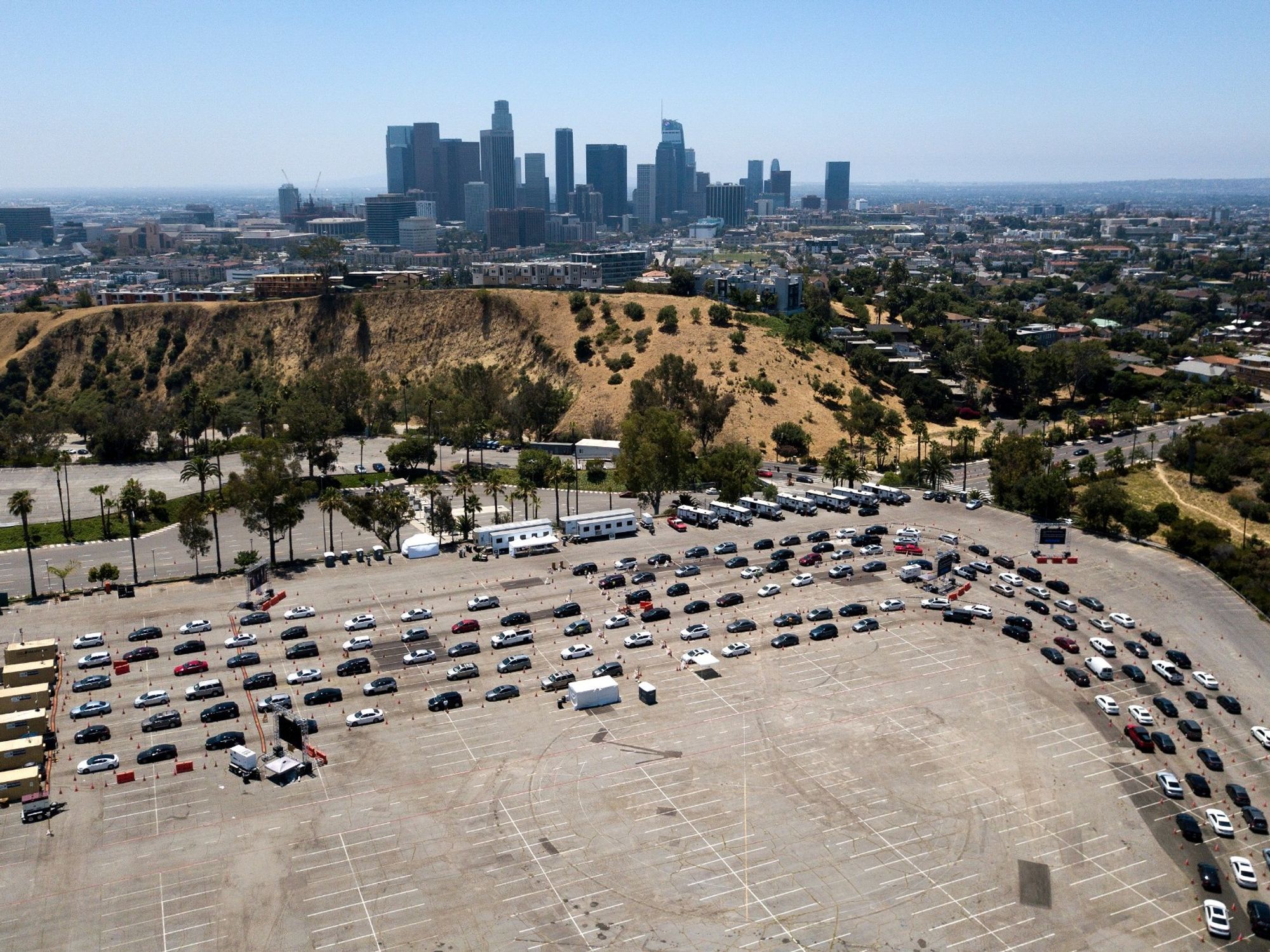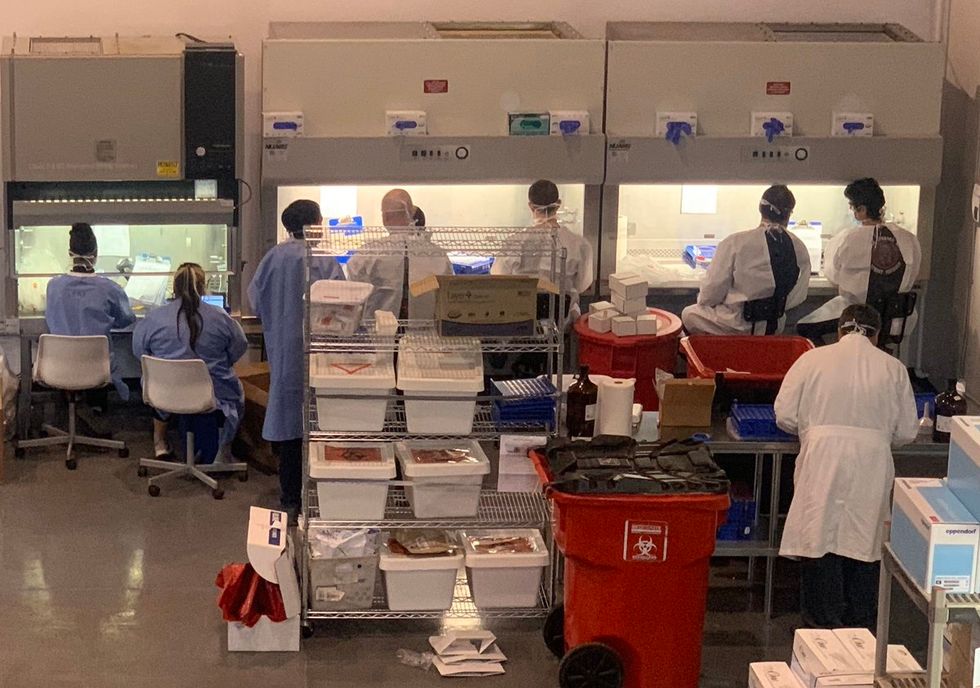Beyond Drive-Thrus: Why Curative Wants to Take COVID Testing to Mobile Vans and Vending Machines
Rachel Uranga is dot.LA's Managing Editor, News. She is a former Mexico-based market correspondent at Reuters and has worked for several Southern California news outlets, including the Los Angeles Business Journal and the Los Angeles Daily News. She has covered everything from IPOs to immigration. Uranga is a graduate of the Columbia School of Journalism and California State University Northridge. A Los Angeles native, she lives with her husband, son and their felines.

COVID-19 testing kiosks could soon be rolling out as the creator of Los Angeles' coronavirus tests looks for ways to get more residents checked for the deadly virus. The founder of Curative Inc, Fred Turner, wants everyone to have access to a test. The company behind Los Angeles' drive-thru coronavirus tests has the capacity to expand testing but said Los Angeles officials have been stymied by lack of access to state and federal funds. Turner, whose tests have a 10% false negative rate, says the reason testing has become difficult have to do with getting them to the populations most at risk, and getting funding to where it's most needed.
Turner talked to dot.LA about the challenges locally and across the country.
Should everyone be able to get a test?
If there's a potential exposure event and somebody wants to get checked to know (whether) they need to quarantine or are they safe to work or be around a loved one, it's very important they have access to that service. Anybody who wants to get tested should get tested. It's not a lab capacity issue, certainly not in L.A..
Priority should be to symptomatic individuals, but we see asymptomatic spread is definitely a key part of the pandemic.
In L.A. city data we've seen about 40% of new infections are in individuals who self identify as asymptomatic. Many of those are pre-symptomatic. Most people do have some symptoms, even if they're mild, but truly asymptomatic cases that never develop any symptoms are quite rare. Many people are infectious and spreading the virus prior to the onset of symptoms. In fact, the day prior to the onset of symptoms is the most infectious day.
The Trump administration wants to have 100 million tests a month by September. Is that feasible?
Potentially. That's one hell of a lift right now. The country is struggling to even get to where we are at right now — at a 10th of what they want to see.
You add a 10x and the supply chain will break all over again. We are already seeing the system bursting at the seams right now.
How much capacity do you have?
We can go up to 100,000 tests per day right now. Our current goal is 1 million a week, by sometime in August.

Curative Inc. founder Fred Turner.
How do you get people back to work? Back to live events?
Well, we need a vaccine. Basically, at this point that's the only only thing that will completely turn this around. And that's on the horizon, but it will take some time and there'll be bottlenecks in scaling up as well. Until then, we have targeted lockdowns of areas. But you need to find where the outbreaks are located in very targeted areas. (That's) not really something that's happening right now and it should be — along with widespread testing and of course wearing a mask.
Contact tracing has gotten a lot better but it still has a long way to go to actually be as useful as it could be.
We have an antigen test now from a blood sample that we are piloting at some of the L.A. sites. They have generally proved to be really quite accurate, though there are some cases that we've seen of individuals who've been asymptomatic or had mild cases who don't develop antibodies.
There's been criticism of Los Angeles saying that some people aren't able to get tested. How do you respond?
The city of Los Angeles has been a really great partner in making sure that we can make testing available to as many people as possible, but they're not getting the funding that they really need to scale that program.
It really needs to be two to three times larger. We're seeing people trying to get appointments and it takes two or three days or they just aren't able to get one. Funding needs to be there so that anybody who wants to get a test can get a test within a day. Right now, we're seeing very high positivity rates across California. The chance of somebody being potentially exposed to SARS COVID 2 is a very real risk for anybody living in California.
Do you think that the country has the capacity to get kids back to school safely and to test them?
Right now in the country, we barely have the capacity to test the amount of people who want to get tested. There is certainly a lot of expansion work that needs to happen to be able to offer widespread screening.
We are continuing to scale up and anticipate hitting 100,000 a day in the next couple of weeks. But the country needs millions of tests per day.
What percentage of the market are you testing right now?
Well, 60,000 tests a day is about 10% of the market right now. We're hoping the rest of the market will continue to scale up as well… A lot of labs have greater than five day turnaround testing right now and obviously makes it challenging. If you don't get the results back fast, they're a lot less useful.
Can you make it any faster?
It can be made somewhat faster. But the larger component has to be shipping time. So we focus on keeping the lab time under 24 hours. And then decreasing the shipping time. Some of the other labs take multiple days for lab processing. We've been focused more on how we can get samples to the lab quickly. So, putting samples on cargo commercial flights to get into the lab the same day.
We have also been experimenting with other methodologies of getting tests to us other than just the walkthrough and the drive-thrus. We have mobile vans in Los Angeles that we are working with. We're working on a project to have a semi automated vending machine kiosk type service that could be deployed across cities.
What are the kiosks and why are you considering that?
The drive thrus have been great for big cities where they have the staff and the space to put something like that (together), but it's been challenging for some of the smaller cities to really deploy testing — even the larger cities. You reach a point where the entire fire department is deployed to do testing. That's not feasible for the long term. We've been trying to figure out ways where we can keep testing going without consuming too many of the city's resources, and also to reach neighborhoods that may not have easy access to testing.
Are you looking at it in Los Angeles?
We are looking at sites in Los Angeles and in the Bay Area. So we're working with the city of L.A. right now on the mobile testing unit to deploy that to the most useful places to target hot spots.
What are the bottlenecks in scaling testing as the caseload grows? Do you see a kiosk in every supermarket?
Until there is a vaccine, we need to have more rigorous testing to return people to work. We're not seeing any lab bottlenecks right now. We have more capacity and continue to take on new states and counties to scale our testing. The bottlenecks are really in two places. First, the logistics of actually getting a test kit out to people, doing the collections and getting it back again.
One of the challenges in California, testing is very fragmented right now, and in some cases it's led by counties and some cities. There isn't really a statewide plan to push that out.
The other bottleneck is funding. There's a massive amount of funding available in the CARES Act that doesn't necessarily trickle down to the counties to deploy.
What do you mean it's fragmented? How has that played out?
We have to set up separate arrangements for every single small city, fire department and police department one by one. It is a very slow process. Whereas in some states, the states have come in and contracted [services]. it's a much more efficient process to roll it out that way.
There are tens of billions of dollars in the CARES Act that has gone to states but it isn't trickling down. They're apportioned based on population with every state, getting a minimum of $1.25 billion. It's not getting down to the counties and the cities.
Does that mean that counties and cities aren't deploying testing as much as they should?
Absolutely. They are limited right now because the budget for testing is insufficient for the scale that's needed. That's one of the reasons we've worked with the city of Los Angeles to transition their testing to post billing to insurance. But, the insurance billing cycle is slow and long. It adds a lot of complexity to our process.
This interview has been edited for length and clarity.
- Coronavirus Test Kit Facility Aims to Produce 10K A Day in L.A. - dot ... ›
- FDA Approves Curative Inc's COVID-19 Test - dot.LA ›
- COVID-19 Test Kit-Maker Curative Inc.is Struggling to Ramp Up - dot ... ›
- Here's How Curative, Inc, Plans to Roll Out Coronavirus Testing to ... ›
- Your Next COVID Test Could Come From a Vending Machine - dot.LA ›
- Your Next COVID Test Could Come From a Vending Machine - dot.LA ›
- 'Angel City' Women's Soccer Club is Coming to LA - dot.LA ›
- Curative Inc. Brings COVID-19 Testing Kiosks to Los Angeles - dot.LA ›
- Los Angeles Opens COVID Testing Kiosk at Union Station - dot.LA ›
- Los Angeles Opens COVID Testing Kiosk at Union Station - dot.LA ›
Rachel Uranga is dot.LA's Managing Editor, News. She is a former Mexico-based market correspondent at Reuters and has worked for several Southern California news outlets, including the Los Angeles Business Journal and the Los Angeles Daily News. She has covered everything from IPOs to immigration. Uranga is a graduate of the Columbia School of Journalism and California State University Northridge. A Los Angeles native, she lives with her husband, son and their felines.




 Image Source: Revel
Image Source: Revel
